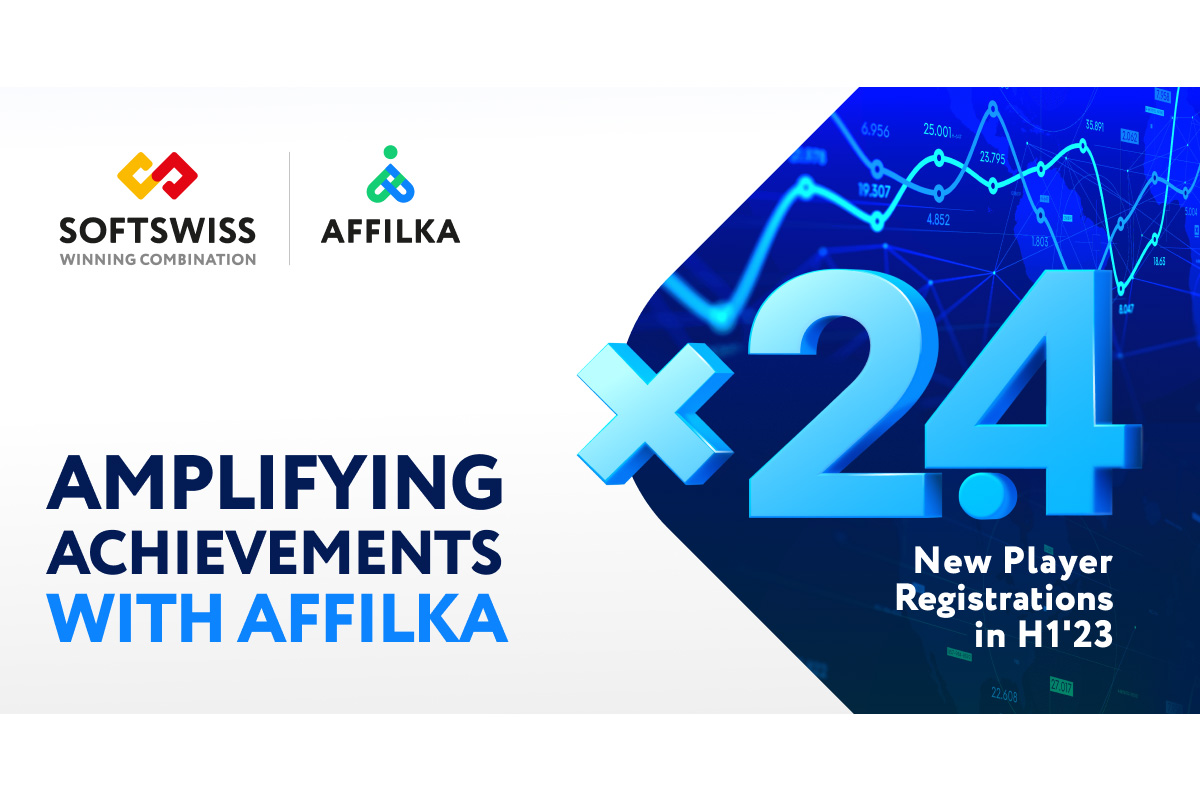Latest News
Affiliates Bring 10 Million New Players: Affilka Recaps H1’23

In H1 2023, iGaming brands, collaborating with Affilka by SOFTSWISS, harnessed its power to draw in over 10 million new players through affiliates. SOFTSWISS, a leading tech company offering top-notch solutions for iGaming, shares the product performance results derived from the data spanning 240 Affilka’s clients.
In the first half of the year, 43.7 thousand new affiliate accounts were registered, constituting a significant quarter of all affiliate accounts ever reсorded in the platform’s operational history since 2018. This figure showcases substantial growth, almost 2.3 times greater than in the corresponding period of the previous year.

The rise in new affiliate accounts has catalysed an even more rapid expansion in new player registrations. When comparing the first halves of 2023 and 2022, this indicator has surged by over 2.4 times. This figure highlights the pivotal role of effective affiliate management in driving iGaming success.

The number of clicks on referral links has demonstrated the most impressive growth among all Affilka’s indicators, surging by 8.7 times between H1 2022 and H1 2023. “This surge occurred both due to the increase in the number of affiliate partners and the advancement of the brands powered by Affilka. Operators grow, enter new markets, and try to work with new types of traffic and new affiliates,” explains Anastasia Borovaya, Head of Affilka by SOFTSWISS.

Shifting focus to the financial performance indicators of Affilka, it is worth noting their consistent trend of growth throughout the analysed period. Notably, the affiliate GGR increased by 79.2%. Concurrently, the player deposit amount and affiliate payments both surged, expanding by 90.4% and 60% respectively.
Anastasia Borovaya, Head of Affilka by SOFTSWISS comments: “In our commitment to maintain a traditionally high level of service, even with a growing number of clients and their affiliates, we have expanded our team almost by a third over the past year. As for now, we are engrossed in expanding the traffic reporting scope, which involves providing in-depth analytics regarding clicks. The Affilka team is working on further enhancing our commission constructor, despite it having already established itself as the market’s most adaptable option.”
Affilka by SOFTSWISS is gearing up for the upcoming SBC Summit Barcelona 2023, joining the innovative SOFTSWISS lineup. At stand CG58, the Affilka team plans meetings with their current partners, potential clients and B2B platform providers.
About SOFTSWISS
SOFTSWISS is an international iGaming company supplying certified software solutions for managing gambling operations. The expert team, which counts 1,400 employees, is based in Malta, Poland, Georgia, and Belarus. SOFTSWISS holds a number of gaming licences and provides one-stop-shop iGaming software solutions. The company has a vast product portfolio, including the Online Casino Platform, the Game Aggregator with thousands of casino games, the Affilka affiliate platform, the Sportsbook Platform and the Jackpot Aggregator. In 2013, SOFTSWISS was the first in the world to introduce a Bitcoin-optimised online casino solution.
Affiliate Succes
Hiring Blitz Expands Quantum Affiliate’s Staff By 10%

The UK-based affiliate is expanding its marketing and commercial teams by hiring six new staff members, while there are still five positions to be filled.
Power affiliate Quantum (previously QiH Group) has experienced significant expansion in the initial two months of 2026, hiring six new staff members for its commercial and marketing teams since December.
First on the list is Shannon Walsh, who enters the swiftly expanding commercial department as a partnerships manager.
Dimi Papamichael, speaking about the stellar growth of his team, said: “From day one, I’ve felt a huge amount of backing and belief in what we’re building here at Quantum – and that’s already turning into real momentum. We’ve recently hired a couple of great people to join our growing commercial team, and we’re not stopping there – with a few more hires lined up in the next couple of months.
“It’s a clear sign of where we’re heading, and there’s a real energy around the business right now. With big plans for this year, we’re continuing to invest in the commercial team to make sure we’ve got the right people in place to move quickly on the opportunities ahead. I’m excited to be building such an ambitious and talented team as we head into a big 2026, and I’m looking forward to what we can achieve together.”
The marketing team, headed by Luke Watkin, is proud to welcome:
- Cameron Harris, Marketing Specialist
- Caitlin McIntyre, Affiliate Sales Lead
- Caroline Millington, Affiliate Account Manager
- Ariadni Argyropoulou, paid social specialist
- Gabriela Profir, performance marketing lead
Luke Watkin, director of marketing for Quantum, said: “As a leader I’ve found it to be extremely energising having the backing, the investment, and the ambition within the business to be able to recruit top marketing talent in a number of key positions in recent months. In a short space of time we have really levelled up the quality of our team, and this is already paying dividends both in terms of how we are working, but also (and most importantly) in the form of results. I am excited to continue doing what I love, which is building brilliant teams.”
In addition to the six roles, Quantum is also seeking to fill roles for:
- head of sales
- senior business development manager
- paid social lead and
- sales ops executive
HR Director for Quantum, Andrea Talreja, shared: “It’s a time of exceptional growth for Quantum, which is exciting and rewarding. We’re seeking not only the roles listed here, but quite a few more in 2026, so if you’re a tech or performance marketing professional – whether from iGaming or other sectors – please get in touch!”
The post Hiring Blitz Expands Quantum Affiliate’s Staff By 10% appeared first on Eastern European Gaming | Global iGaming & Tech Intelligence Hub.
CasinoCanada
CasinoCanada announces new partnership with MelBet

CasinoCanada has announced a strategic partnership with MelBet, the international betting and gaming operator, aimed at expanding the brand’s footprint in Canada through dedicated content and brand representation on CasinoCanada’s digital platforms.
Under the agreement, CasinoCanada.com will produce detailed reviews and SEO-focused content tailored to Canadian audiences. The partnership is designed to provide users with clear, transparent information about MelBet’s products and services, while enhancing the operator’s visibility in Canada and driving traffic to the MelBet website.
CasinoCanada is operated by SEOBROTHERS, and Eugene Ravdin, Head of PR, said:
“MelBet operates across multiple international markets and has established a consistent presence in the iGaming industry. Through CasinoCanada, we will focus on delivering clear, data-based content tailored to users in Canada and quality traffic to the MelBet website. This partnership is structured around transparent communication and long-term cooperation.”
MelBet offers daily betting on over 1,000 events across sports and esports, alongside a wide range of slots from more than 120 global providers. The brand has earned multiple accolades, including Best Online Gambling Operator (EVENTUS 2023), Best Affiliate Program (SiGMA Africa Awards 2024), and Live Casino of the Year (AffPapa iGaming Awards 2024).
The operator’s high-profile sports partnerships feature legends such as Andrés Iniesta, Didier Drogba, and Kamaru Usman. In October 2025, MelBet extended its agreement as Juventus’ official betting partner in MENA and Africa, while Spanish La Liga and professional Dota 2 organisation OG Esports further enhance its global portfolio.
Anastasiia Shcherbyna, CMO at MelBet Affiliates, commented:
“Working with CasinoCanada has been smooth and efficient. They understand the specifics of our brand, communicate clearly, and consistently deliver on their commitments. We appreciate their professional approach and see strong potential for long-term cooperation.”
This collaboration positions MelBet for sustained growth in Canada, leveraging CasinoCanada’s content expertise and digital reach to strengthen brand awareness and user engagement.
The post CasinoCanada announces new partnership with MelBet appeared first on Eastern European Gaming | Global iGaming & Tech Intelligence Hub.
Barbara Bang
QTech Games Amplifies Action Through Barbara Bang Integration

Emerging-markets leader enhances its content selection with new games from a rising contender.
QTech Games, the premier game aggregator for emerging markets, has sustained its robust momentum in its pipeline, owing to its recent agreement with promising studio, Barbara Bang, a slots provider recognized for its unique method of game development and a customized approach to discovering localized solutions for various markets.
Incorporating an outstanding portfolio from a highly unique and innovative digital slots supplier further enhances QTech Games’ expanding platform, which is bringing a diverse selection of online games to emerging markets, featuring well-known brands alongside the industry’s most thrilling new providers.
The games offered to QTech partners through this agreement are crypto-friendly and include popular titles and new releases like Sky Rail Riches, Juicy Fruits, Sunshine Rich, and Chieftain Buffalo. Each utilizes distinct maths modeling that alters the volatility spectrum, contributing to an engaging gaming experience.
Philip Doftvik, QTech Games’ CEO, said: “We’re committed to rolling out first-class content that drives revenue for our partners. So, this deal with Barbara Bang extends our impressive sequential pipeline – and we’ve so much more to come in 2026! In today’s marketplace, only high-quality games offering something different separate you from the rabble, so we’re delighted to see how Barbara Bang is fulfilling this demand. Their dedication to data-driven content development, coupled with an acute focus on even the most specific player-centric details, matches up neatly with QTech’s own localisation techniques across emerging markets.
George Dias, Partnership Manager of Barbara Bang, added: “Barbara Bang prides itself on our ever-expanding production line of titles which provide unique and head-turning experiences in an increasingly homogenised space. And we’ve found QTech to be a natural habitat for embracing such content, and delivering it to new audiences. Founded with the goal of bridging the gap between players and gaming platforms, Barbara Bang is now acquiring progressive recognition in the iGaming market, thanks to this deal with the top aggregator QTech Games.
“We’re confident that this partnership will allow us to seamlessly broaden the scope of our slots for fresh audiences across emerging markets. It’s a significant step for Barbara Bang in enlarging our global footprint.”
The post QTech Games Amplifies Action Through Barbara Bang Integration appeared first on Eastern European Gaming | Global iGaming & Tech Intelligence Hub.
-

 Amusnet5 days ago
Amusnet5 days agoWeek 7/2026 slot games releases
-

 Aphrodite’s Kiss5 days ago
Aphrodite’s Kiss5 days agoLove on the Reels: Slotland Introduces “Aphrodite’s Kiss”
-

 Denmark6 days ago
Denmark6 days agoRoyalCasino Partners with ScatterKings for Company’s Danish Launch
-

 Baltics6 days ago
Baltics6 days agoEstonia to Reinstate 5.5% Online Gambling Tax From March 1
-

 Booming Games6 days ago
Booming Games6 days agoTreasure Hunt Revival — Booming Games Launches Gold Gold Gold Hold and Win
-

 Brino Games5 days ago
Brino Games5 days agoQTech Games integrates more creative content from Brino Games
-

 Bet Rite6 days ago
Bet Rite6 days agoSpintec Expands into Canada with Bet Rite
-

 ELA Games6 days ago
ELA Games6 days agoELA Games Unveils Tea Party of Fortune — A Magical Multiplier Experience































